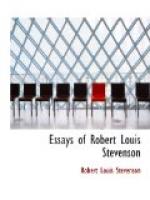Conclusions, indeed, are not often reached by talk any more than by private thinking. That is not the profit. The profit is in the exercise, and above all in the experience; for when we reason at large on any subject, we review our state and history in life. From time to time, however, and specially, I think, in talking art, talk becomes effective, conquering like war, widening the boundaries of knowledge like an exploration. A point arises; the question takes a problematical, a baffling, yet a likely air; the talkers begin to feel lively presentiments of some conclusion near at hand; towards this they strive with emulous ardour, each by his own path, and struggling for first utterance; and then one leaps upon the summit of that matter with a shout, and almost at the same moment the other is beside him; and behold they are agreed. Like enough, the progress is illusory, a mere cat’s cradle having been wound and unwound out of words. But the sense of joint discovery is none the less giddy and inspiring. And in the life of the talker such triumphs, though imaginary, are neither few nor far apart; they are attained with speed and pleasure, in the hour of mirth; and by the nature of the process, they are always worthily shared.
There is a certain attitude, combative at once and deferential, eager to fight yet most averse to quarrel, which marks out at once the talkable man. It is not eloquence, not fairness, not obstinacy, but a certain proportion of all of these that I love to encounter in my amicable adversaries. They must not be pontiffs holding doctrine, but huntsmen questing after elements of truth. Neither must they be boys to be instructed, but fellow-teachers with whom I may, wrangle and agree on equal terms. We must reach some solution, some shadow of consent; for without that, eager talk becomes a torture. But we do not wish to reach it cheaply, or quickly, or without the tussle and effort wherein pleasure lies.




